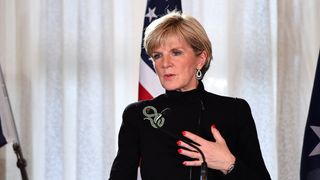Rex Tillerson and James Mattis will be in Sydney on Monday for AUSMIN (the Australia – United States Ministerial Consultations) with their Australian counterparts Julie Bishop and Marise Payne. Priorities for discussion at Kirribilli House: China’s role in Asia, North Korea’s growing nuclear capabilities, ISIS, Iraq, Syria and Afghanistan as well as US-Australia cooperation in South East Asia and the Pacific.
AUSMIN is always a valuable opportunity for Australia to influence many of the key foreign and defence policy players in the US government, but this year’s iteration is even more important than usual. It is the first AUSMIN with the Trump administration’s Secretaries of State and Defense, and comes almost two years after former Secretary of State John Kerry hosted Bishop and Payne in Boston in 2015.
This year’s AUSMIN follows a high tempo of political-level meetings between Australia and the United States in 2017, including Senator John McCain’s visit to Australia and Alliance 21 Lecture last Tuesday, the Trump-Turnbull meeting at the Battle of the Coral Sea commemoration in New York in early May, and Vice President Pence’s trip to Sydney in April.
AUSMIN will take place against a backdrop of uncertainty over US Asia policy and growing regional tensions.
But AUSMIN will likely be the most substantive Australian engagement with the Trump administration thus far. Prime Minister Turnbull’s meetings with both Trump and Pence were relatively short, get-to-know-you affairs, whereas AUSMIN is a day-long series of formal discussions on key regional and global issues. The US delegation to AUSMIN includes not just Mattis and Tillerson, but also the Chairman of the Joint Chiefs of Staff, General Joseph F. Dunford and Commander of the US Pacific Command, Admiral Harry Harris.
AUSMIN will take place against a backdrop of uncertainty over US Asia policy and growing regional tensions. Both Prime Minister Turnbull and Secretary Mattis will spend this weekend in Singapore at the Shangri-La Dialogue, where Turnbull is delivering the keynote address and Mattis’ every word will be watched closely by Asian leaders. Regional strategic dynamics will be front of mind at AUSMIN, and in Turnbull’s separate meetings with Secretaries of State and Defense.
Additionally, new research by the United States Studies Centre shows that the Australian public believes that America’s regional influence is in decline. The Asian Research Network survey shows that 72 per cent of Australian respondents view China as the most influential country in the Indo-Pacific region, while more than half of Australians (62 per cent) perceive American influence in the next five years as negative under President Trump.






